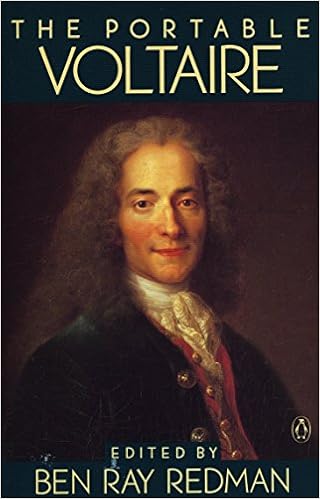This Day in History: French Enlightenment writer, historian, and philosopher Voltaire died on this day (May 30) in 1778. Born François-Marie Arouet, he was known for his wit, his criticism of the Church—as well as his advocacy of freedom of speech, freedom of religion, and separation of church and state.
Voltaire was a versatile and prolific writer who produced works in almost every literary form, including plays, poems, novels, essays, histories, and scientific expositions. He wrote more than 20,000 letters and 2,000 books and pamphlets. He was one of the first authors to become renowned and commercially successful internationally. He was an outspoken advocate of civil liberties, and he was at constant risk from the strict censorship laws of the Catholic French monarchy. His polemics witheringly satirized intolerance, religious dogma, and the French institutions of his day.
Voltaire weighed in on everything, from dogs to death to vampires to the Trinity doctrine. He even gave the world the very first detective in his Zadig.
He became very wealthy by exploiting a flaw in the French lottery. He also set up a successful watchmaking business in his old age.
He wrote of books, "What multiplies books, despite the law of not multiplying beings unnecessarily, is that with books one makes others; it is with several volumes already printed that a new history of France or Spain is fabricated, without adding anything new. All dictionaries are made with dictionaries; almost all new geography books are repetitions of geography books. The Summation of St. Thomas has produced two thousand fat volumes of theology; and the same family of little worms that have gnawed the mother, gnaw likewise the children."
This is interesting as Voltaire has been accused to plagiarism. "If Voltaire's forwardness in exposing the plagiarisms of others was intended to remove from himself all suspicion of similar practices, it failed of success. Nodier, in his valuable work, 'Questions de Litterature Legale,' quotes several instances of plagiarism in Voltaire, and especially in his romance of 'Zadig.' Freron, too, in the 'Annee Litteraire,' 1767, describes a whole chapter in this romance as copied from 'Les Voyages et Aventures de trois Princes de Sarrendip,' a work translated from the Italian, and published at Paris in 1719; and the same writer has shown that Voltaire's 'Episode de l'Ermite' is adopted from Parnel's poem of 'The Hermit.'"
"Of all the forms of theft," says he, "plagiarism is the least dangerous to society."
Voltaire drank between 40 and 50 cups of coffee everyday and paid enormous fees to have luxury coffee imported. He was warned this would kill him, but he did manage to live to age 83.
He was also critical of Shakespeare's fame in France: "France has not insults, fool’s-caps, and pillories enough for such a scoundrel. My blood boils in my own veins while I speak to you about him … And the terrible thing is that … it is I myself who was the first to speak about this Shakespeare [in France]. I was the first who showed to the French a few pearls which I had found in his enormous dunghill."
The one thing I've come to appreciate from Voltaire in my life is just how quotable he was:
Tears are the silent language of grief.
It is dangerous to be right in matters on which the established authorities are wrong.
Think for yourself and let others enjoy the privilege of doing so too.
Those who can make you believe absurdities, can make you commit atrocities.
The mirror is a worthless invention. The only way to truly see yourself is in the reflection of someone else’s eyes.
Cherish those who seek the truth but beware of those who find it.
Common sense is not so common.
It is forbidden to kill; therefore all murderers are punished unless they kill in large numbers and to the sound of trumpets.
If God did not exist, it would be necessary to invent him.
The more often a stupidity is repeated, the more it gets the appearance of wisdom.
Judge a man by his questions rather than by his answers.
Every man is guilty of all the good he did not do.
Doubt is an uncomfortable condition, but certainty is a ridiculous one.
There is no God, but don’t tell that to my servant, lest he murder me at night.
If you have two religions in your land, the two will cut each other's throats; but if you have thirty religions, they will dwell in peace.
I disapprove of what you say, but I will defend to the death your right to say it.
Superstition is to religion what astrology is to astronomy the mad daughter of a very wise mother.
It is difficult to free fools from the chains they revere.
There is an astonishing imagination, even in the science of mathematics.... We repeat, there was far more imagination in the head of Archimedes than in that of Homer.
The Holy Roman Empire is neither Holy, nor Roman, nor an Empire.
We must cultivate our own garden. When man was put in the garden of Eden he was put there so that he should work, which proves that man was not born to rest.
I have never made but one prayer to God, a very short one: 'O Lord make my enemies ridiculous.' And God granted it.
A witty saying proves nothing.
All the known world, excepting only savage nations, is governed by books.
The true triumph of reason is that it enables us to get along with those who do not possess it.
Men hate the individual whom they call avaricious only because nothing can be gained from him.
I know many books which have bored their readers, but I know of none which has done real evil.


No comments:
Post a Comment